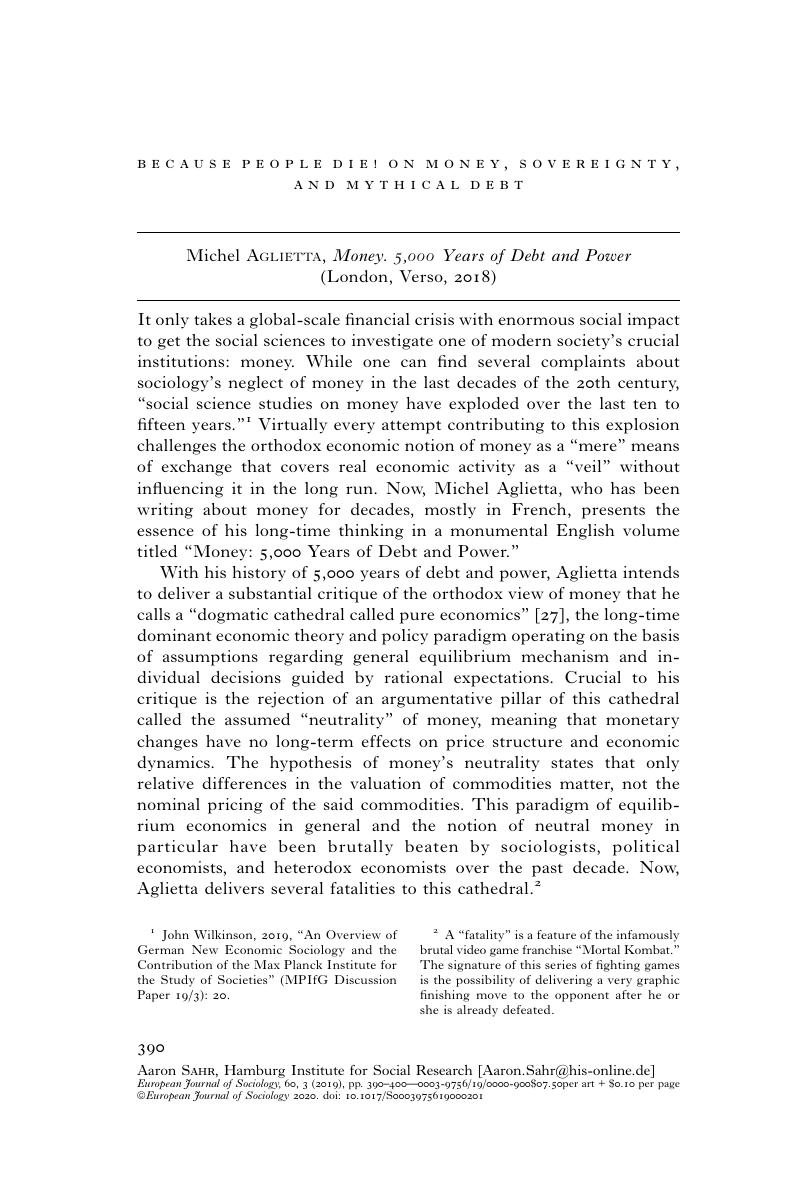No CrossRef data available.
Published online by Cambridge University Press: 14 February 2020

1 John Wilkinson, 2019, “An Overview of German New Economic Sociology and the Contribution of the Max Planck Institute for the Study of Societies” (MPIfG Discussion Paper 19/3): 20.
2 A “fatality” is a feature of the infamously brutal video game franchise “Mortal Kombat.” The signature of this series of fighting games is the possibility of delivering a very graphic finishing move to the opponent after he or she is already defeated.
3 For example, L. Randall Wray, 1998, Understanding Modern Money (Edward Elgar); Stephanie Bell, 2001, “The Role of the State and the Hierarchy of Money,” Cambridge Journal of Economics, 25 (2): 149-163; Geoffrey Ingham, 2004, The Nature of Money (Polity Press); Perry Mehrling, 2011, The New Lombard Street. How the Fed Became the Dealer of Last Resort (Princeton University Press); or, in one of the most compelling histories of money, in my opinion, Christine Desan, 2014, Making Money. Coin, Currency, and the Coming of Capitalism (Oxford University Press).
4 Dirk Bezemer, 2016, “Towards an ‘Accounting View’ on Money, Banking and the Macroeconomy: History, Empirics, Theory,” Cambridge Journal of Economics, 40: 1275-1295.
5 Perry Mehrling, 2017, “Financialization and its Discontents,” Finance and Society, 3 (1): 1-10.
6 On the one hand, this history is full of political struggles: Roman emperors competing with money owners over the metallic content of coins, capitalist states structuring monetary institutions in accordance with the interest of bourgeois capital, and so on. But, on the other hand, the general tendency of the history of money seems to be depoliticized. Somehow, the development of the principles of sovereignty and monetary orders keeps its correlation up. Monetary orders somehow adapt to the upheavals of sovereignty principles, but the causal mechanisms remain a bit fuzzy, at least to me. Do we always just adjust our political and economic systems to the changing imaginaries of sovereignty?
7 Take this thesis as an example: “The abolition of the gold standard poses the problem of the legitimacy of monetary signs” [254]. For whom and in what manner? General money users? Investors? The academics trying to fit this bit of reality into their theories still oriented towards commodity money?
8 Klaus Kraemer, 2019, “Geld als Institution. Eine Kritik der Vertrauenshypothese,” Mittelweg, 36 28 (3-4): 50-74.
9 This claim, however, would have benefited from evidence. In 2019, for example, government bonds in Germany, France, Japan, and some other countries offer negative yields to investors, who show a great demand, nevertheless. They pay to lend money to those countries, while the US still pays interest to its investors. Can this also be explained by military and political power? Does it mean that investors judge France to be more politically powerful than America? It might be sufficient to assume that people seek liquid assets that they expect others (regulators, markets, shareholders) to accept as legitimate ways to balance their books.
10 Christine Desan, 2014, Making Money. Coin, Currency, and the Coming of Capitalism (Oxford, Oxford University Press).